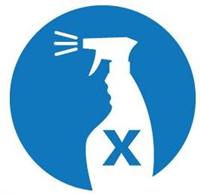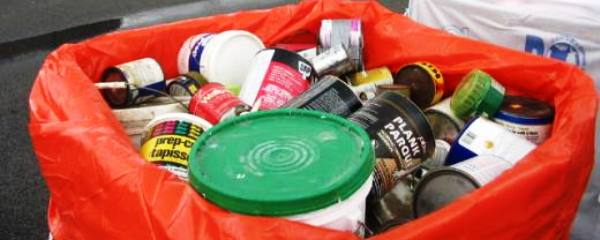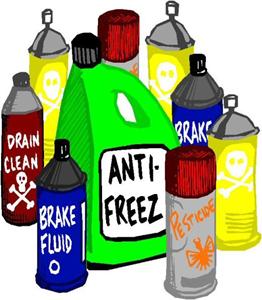Household Hazardous Waste Collections
Summary of Household Hazardous Disposal:

- Every home has hazardous waste. Whenever a cleaner or maintenance item is unwanted, it is hazardous waste.
- Will County offers one-day collections and helps fund a year-round Regional collection site.
- Some items may also be taken to retail outlets for proper disposal and recycling services.
To find out more information on household hazardous waste products click on the following links:
Will County partners with some libraries and promotes some retailers to bring residents options for proper battery disposal. Click Batteries for details.
Will County Land Use Department, Resource Recovery and Energy Division promtes some retailers that offer flourescent light recycling service, click Fluorescent Lights for details.
The EPA ceased to recognize latex paint as hazardous in 2000 and it ceased to be accepted in HHW programs. In 2023 Will County and many others accross Illinois were excited to see a statewide Paint Stewardship Act passed. Beginning in 2025, some retailers will offer paint recycling year round for businesses and residents. Please be aware that Will County accepts both latex and oil-based paint (limit 15 gallons) from residents at one-day Household Hazardous Waste Collection events.
In 2022 Will County was proud to participate in the passage of the Pharmaceutical Take-Back Act which placed the cost of collection and disposal on pharmaceutical manufacturers and opened the door to hundreds more collection sites around Illinois. For a full list of options, click Medication for details.
A Few Helpful Tips:
- Think before you buy: Avoid products that may become hazardous waste
- Buy the least hazardous product that will d
 o the job, such as low VOC paint. For items that cannot be fully used, safely store until the next Household Hazardous Waste Collection or bring to a permanent site for disposal.
o the job, such as low VOC paint. For items that cannot be fully used, safely store until the next Household Hazardous Waste Collection or bring to a permanent site for disposal.
- Read the label of the products that qualify as nontoxic, they may still contain hazardous ingredients in smaller amounts.
- Check for health warnings.
- You may wish to avoid aerosol products. In the use of an aerosol product, tiny droplets can be deeply inhaled and absorbed into the bloodstream.
- Check out the County’s ABC’s of Cleaning Alternatives brochure for more ideas.
Use Products Safely
- Use hazardous products safely by paying attention to proper use instructions.
- Mixing products can cause explosive or poisonous chemical reactions, products may contain incompatible ingredients that may react when mixed.
- Do not eat, drink, smoke, or wear soft contacts while using hazardous products.
- Use in well ventilated area.
- Use protective gloves, goggles and respirators that are appropriate for the task.

Hazardous Chemical Storage
- Keep out of the reach of children and animals.
- Make sure they are sealed correctly.
- Do not store near food.
- Keep away from heat, flame, switches, motors and ignition areas.
- Store volatile chemicals in a well ventilated area.
- Never store contaminated rags near hazardous products.
- Keep item specific fire extinguishers near vicinity and check charge level regularly.
- Check containers regularly to insure they are dry and not corroding.
| Accepted |
Not Accepted |
| Paint – Oil-based ONLY (Latex paint is not considered hazardous, but is not accepted in liquid form by waste haulers. This may be dried and hardened for disposal or it may be Recycled, see Latex) |
Latex Paint |
| Stains & Thinners |
Smoke Detectors |
| All Automotive Fluids (motor oil, antifreeze, brake fluid, etc.) |
Ammunition |
| Old Gasoline (The EPA allows people to add old gasoline to a full tank of gas in their vehicle) |
Business Waste |
| Lawn Chemicals |
Medical Waste |
| Driveway Sealant |
Household Garbage |
| Cleaning Products |
|
| Solvents |
|
| All Aerosol Products |
|
| Hobby & Pool Chemicals |
|
| Asbestos materials. In a size that will fit in a 55-gallon drum and not in excess of 50 pounds. Must be triple bagged |
|
| Batteries (automotive lead-acid, button batteries and marine batteries, rechargeable, litium) |
|
| Mercury & Mercury Containing Products (thermometers, thermostats, fluorescent lights) |
|
| E-cigarettes, Vapes and Pods |
|
| Fire Extinguishers |
|
| Propane tanks up to 20 lbs. |
|
| Unknown hazardous substances |
|
SIGNAL WORDS: Products that have one or more of the following properties:
- Corrosive: Chemical action can burn and destroy living tissues or other materials when brought in contact.
- Explosive/Reactive: Can detonate or explode through exposure to heat, sudden shock, pressure or incompatible substances.
- Toxic: Capable of causing injury or death through ingestion, inhalation or skin absorption.
- Flammable/Combustible: Can be easily set on fire.
Full Service Drop-Off Sites:
Will County Land Use, Resource Recovery & Energy Department holds at least two Household Hazardous Waste Collection Events in the spring and at least one every fall.
Accepted Items
- automotive fluids
- extinguishers
- flammables: gasoline, kerosene, oil, transmission fluid, anti-freeze (think of things in a garage)
- fluorescent bulbs, CFL bulbs, LED bulbs
- paints and stains (oil-based only)
- peanut oil (cooking oils)
- pesticides
- fertilizers
- partially filled aerosol cans
- asbestos (small amount - triple bagged)
- propane tanks - hand held size)
- solvents and strippers
- thermostats
- mercury
- automotive and marine (lead acid) batteries
- cleaners
- drain openers
- pool chemicals
- unknown hazardous liquids
Will County also helps to fund a permanent HHW Drop-Off open every weekend (except holidays):
Naperville Regional HHW
156 Fort Hill Drive (as of February 21, 2015)
Naperville, IL
(prefer no phone calls)
Saturday & Sunday 9am-2pm
There are four other permanent HHW facilities in the state, receiving disposal funding from the Illinois EPA. The next closest one to Will County is in Chicago:
Chicago Regional HHW
1150 N North Branch on Goose Island
Chicago, IL
312-744-7672
Tuesday 7am-12pm
Thursday 2pm-7pm
First Saturday of the month 8am-3pm
Last Updated: 8/8/24